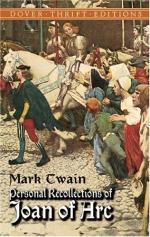We knew nothing about what had been happening in the dungeon in the yester-afternoon. We supposed that as Joan had abjured and been taken back into the forgiving bosom of the Church, she was being gently used now, and her captivity made as pleasant and comfortable for her as the circumstances would allow. So, in high contentment, we planned out our share in the great rescue, and fought our part of the fight over and over again during those two happy days—as happy days as ever I have known.
Sunday morning came. I was awake, enjoying the balmy, lazy weather, and thinking. Thinking of the rescue—what else? I had no other thought now. I was absorbed in that, drunk with the happiness of it.
I heard a voice shouting far down the street, and soon it came nearer, and I caught the words:
“Joan of Arc has relapsed! The witch’s time has come!”
It stopped my heart, it turned my blood to ice. That was more than sixty years ago, but that triumphant note rings as clear in my memory to-day as it rang in my ear that long-vanished summer morning. We are so strangely made; the memories that could make us happy pass away; it is the memories that break our hearts that abide.
Soon other voices took up that cry—tens, scores, hundreds of voices; all the world seemed filled with the brutal joy of it. And there were other clamors—the clatter of rushing feet, merry congratulations, bursts of coarse laughter, the rolling of drums, the boom and crash of distant bands profaning the sacred day with the music of victory and thanksgiving.
About the middle of the afternoon came a summons for Manchon and me to go to Joan’s dungeon—a summons from Cauchon. But by that time distrust had already taken possession of the English and their soldiery again, and all Rouen was in an angry and threatening mood. We could see plenty of evidences of this from our own windows—fist-shaking, black looks, tumultuous tides of furious men billowing by along the street.
And we learned that up at the castle things were going very badly, indeed; that there was a great mob gathered there who considered the relapse a lie and a priestly trick, and among them many half-drunk English soldiers. Moreover, these people had gone beyond words. They had laid hands upon a number of churchmen who were trying to enter the castle, and it had been difficult work to rescue them and save their lives.
And so Manchon refused to go. He said he would not go a step without a safeguard from Warwick. So next morning Warwick sent an escort of soldiers, and then we went. Matters had not grown peacefuler meantime, but worse. The soldiers protected us from bodily damage, but as we passed through the great mob at the castle we were assailed with insults and shameful epithets. I bore it well enough, though, and said to myself, with secret satisfaction, “In three or four short days, my lads, you will be employing your tongues in a different sort from this—and I shall be there to hear.”




